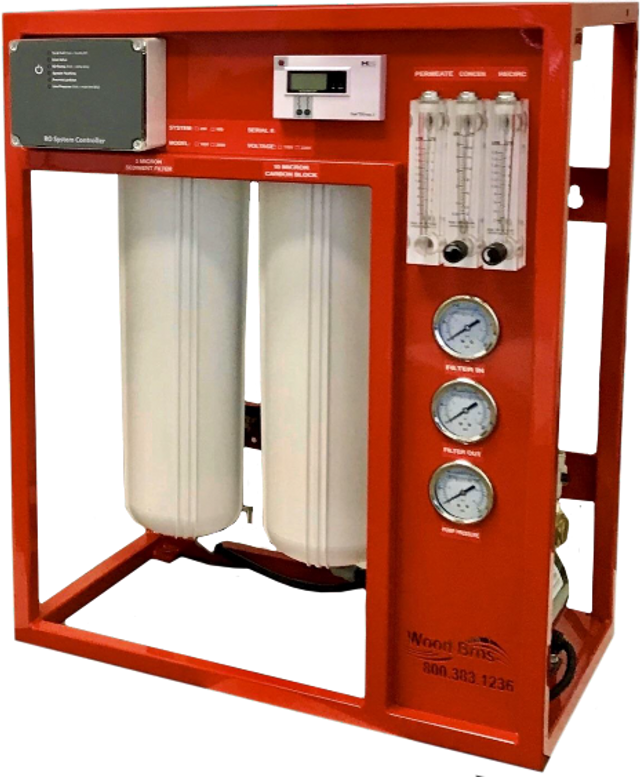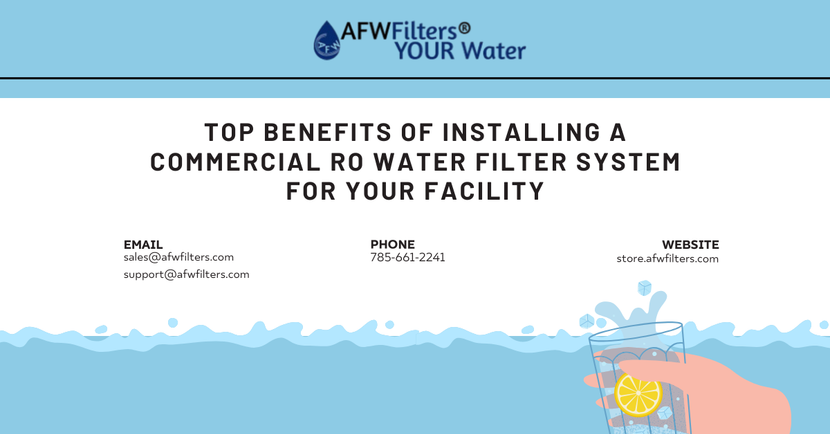Top Benefits of Installing a Commercial RO Water Filter System for Your Facility
For facility managers, business owners or operations executives, water quality is more than a back-office concern. It’s a strategic asset. Whether you run a restaurant, hotel, manufacturing line or office campus, investing in a high-capacity Commercial RO Water Filter System can deliver measurable performance, cost and brand benefits. And when hard water or mineral-laden feed water is a factor, introducing a Commercial Water Softener System upstream often amplifies the value of the RO installation.
In this blog we outline the key advantages of deploying a commercial RO system in your facility, show how it works in harmony with commercial water softeners, and guide you on what to consider before you buy. Let’s begin.

What Is a Commercial RO Water Filter System?
A Commercial RO Water Filter System (RO = Reverse Osmosis) is a large-scale water purification system designed for business, industrial or institutional settings. Unlike residential RO units, these systems handle high flow-rates (hundreds to thousands of litres per hour), high total-dissolved-solids (TDS) loads, and continuous operation demands. They use high-pressure membranes to remove dissolved salts, minerals, and a wide range of contaminants.
Meanwhile, a Water Softener System is typically installed upstream to remove hardness minerals (calcium, magnesium) and reduce scale formation in plumbing, boilers, heat-exchangers or other high-usage equipment. It uses ion-exchange or other media to “soften” the water.

Together, these two systems help ensure your facility gets ultra-clean, reliable water while protecting equipment and reducing maintenance.
Key Benefits of a Commercial RO Water Filter System
Here are the major advantages you’ll gain by installing a commercial RO water filter system in your facility:
- Superior Water Quality & Consistency: A commercial RO system removes up to ~99 % of dissolved solids, salts, and many contaminants, delivering consistently high-quality water. This means better product quality (for food & beverage, labs, manufacturing), better customer experience (restaurants, hotels), and fewer surprises in process water or boiler feed water.
- Equipment Protection & Longer Lifespan: By removing harsh minerals, salts and contaminants, you greatly reduce scale formation, corrosion, fouling and component wear in boilers, chillers, heat exchangers, dishwashers, coffee machines and so on. This boosts equipment lifespan, reduces downtime and lowers replacement/repair costs.
- Cost Savings Over Time: Although the upfront investment can be significant, the long-term cost savings are compelling: lower energy bills (heat transfer is more efficient without scale), fewer maintenance interruptions, less chemical usage, and fewer equipment replacements. For example, a facility reducing scale in its boiler system can realize improved thermal efficiency and lower fuel/energy consumption.
- Regulatory Compliance & Risk Reduction: For many businesses (food-service, hospitality, healthcare, manufacturing), water quality standards are prescribed or heavily regulated. A commercial RO system helps ensure compliance, reduce risk of non-compliance fines, and maintain brand reputation.
- Improved Operational Efficiency & Cleaner Processes: High-quality water supports better cleaning results, reduces downtime linked to water quality issues, ensures consistent product output, and can reduce reliance on bottled water or auxiliary filtration. As one blog explains: “Reverse osmosis filtration systems are particularly good at removing dissolved salts and minerals.” In restaurants or hotels, water-quality issues (taste, odor, scaling) can affect guest satisfaction.
- Environmental & Sustainability Benefits: By reducing dependence on bottled water, lowering energy consumption and chemical usage, a commercial RO system contributes to sustainability goals. For example: “By providing clean drinking water through RO plants, there is less dependence on bottled water, leading to a reduction in environmental pollution.”
For businesses with ESG (environmental-social-governance) goals this is a key benefit.
Why a Water Softener and a RO Often Goes Hand-in-Hand
To get the most out of a commercial RO system, many facilities first install a Commercial Water Softener System. Here’s why:
- Hard water (high in calcium/magnesium) causes scale on membranes, reducing RO membrane life and increasing maintenance.
- By softening water first, you reduce cleaning and replacement cost of RO membranes, improve overall system efficiency, and ensure consistent water output.
- Softeners reduce burden of detergents, soaps, cleaning chemistry in operations such as laundries, kitchens, car washes etc.
- Softened feed to RO improves ROI.
If your facility has challenging water (hardness, high TDS, high mineral load) ask your water-treatment partner about combining the two systems.
What to Consider When Selecting a Commercial RO Water Filter System
To ensure you maximise benefits, consider the following when selecting your system:
- Water usage & capacity: How many gallons/litres per day your facility uses, peak demand, growth projections.
- Feed-water quality: What is the TDS, hardness, pH, temperature, presence of chlorine, sediment, organics, metals? This will determine pretreatment needs (softener, sediment filters, carbon) and RO sizing.
- Flow rate & pressure: Ensure the RO system supports required flow and pressure and includes proper pumps.
- Pretreatment: Softening, sediment removal, carbon filtering, anti-scaling dosing may be required.
- Membrane quality & maintenance: Check expected life, replacement interval, ease of servicing.
- Energy & chemical costs: Lower energy and chemical usage improves ROI.
- Regulatory/standards compliance: Does the system meet your industry’s water-quality and safety standards?
- Total cost of ownership: Up-front cost + operation + maintenance + downtime risk.
- Service & vendor reliability: Choose a qualified provider who can handle installation, commissioning, maintenance and warranty support.
- Space & installation constraints: Mechanical room size, drain line capacity, electrical supply, plumbing modifications.
- Future proofing: Account for expansion, higher capacity, stricter water quality requirements down the line.
Real-World Business Use Cases
- A hotel or resort uses a commercial RO system for guest drinking water, ice machines and cooking achieving consistent taste, increasing guest satisfaction and reducing bottled-water supply costs.
- A manufacturing facility uses the RO system as feed to process equipment, ensuring product quality while reducing downtime caused by scale or contamination.
- A restaurant installs both a water softener system and RO system to protect dishwashers and steamers, reduce energy bills and minimize limescale on glassware.
- A car wash installs a commercial RO system to produce pure water for final rinse leaving no spots or film on vehicles, improving perceived quality and reducing drying costs.
Implementation Tips & Best Practices
Conduct a full water-audit of your facility (volume, usage patterns, water quality tests: TDS, hardness, pH, organics, sediment).
- Sequence systems correctly: typically softener → sediment filter → carbon filter → RO membranes.
- Monitor system performance: track membrane pressure drop, permeate quality, reject rate, softener regeneration cycles.
- Ensure maintenance schedule is defined: filter changes, membrane clean/replace, salt/brine tank refill, servicing.
- Train your onsite staff and include vendor support contract to minimise downtime.
- Budget for the full lifecycle cost: not just equipment purchase.
- Consider scalability: will your system need to scale up if your facility expands?
- Communicate the value internally: easier cleaning, fewer service calls, improved product quality, guest/employee satisfaction.
For any facility that relies significantly on water, whether for operations, guest services, manufacturing or product quality, a properly selected Commercial RO Water Filter System offers strong strategic benefits: superior water quality, equipment protection, operational efficiency, regulatory compliance and sustainability. Pairing it with a Water Softener System delivers even stronger performance and return on investment.
If you’re evaluating water-treatment options for your facility, consider starting with a professional assessment of your current water quality and usage patterns. Choose a supplier who can articulate both the RO system and the softener options, installation and servicing plan.
Ready to take your facility’s water quality to the next level?
Contact our expert team today to schedule a water-audit and explore the right commercial RO + water softener configuration for your facility.
Recent Posts
-
Top Reasons to Install Whole House Water Filters in Kansas Homes
With its rolling plains and urban neighborhoods in Wichita, Kansas City, and Topeka, people in Kansa …Dec 10 2025 -
Top Benefits of Installing a Commercial RO Water Filter System for Your Facility
For facility managers, business owners or operations executives, water quality is more than a back-o …Nov 19 2025 -
Whole House Water Filtration Systems: The Complete Guide to Cleaner, Safer Water
If you own a home or are considering investing in one, you are aware that water quality is crucial. …Nov 19 2025




